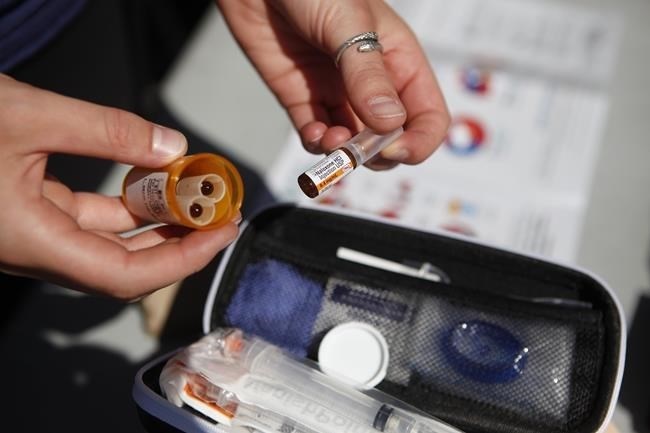
FILE.
Image Credit: THE CANADIAN PRESS/Chad Hipolito
October 20, 2020 - 12:14 PM
Both Kamloops and Kelowna continued to see a high number of fatal drug overdoses in September as COVID-19 fuelled the public health emergency.
New numbers from the B.C. Coroners Service today, Oct. 20, shows cities with the highest number of illegal drug overdoses as of September are Vancouver, Surrey and Victoria.
Last month the Coroner's Service reported that Kelowna and Kamloops saw the fourth-highest number of deaths with 36 apiece, but now that place is reserved for Kamloops alone. As of September of this year, Kamloops had 43 overdose deaths. Through all of 2019, 26 people died of overdoses in Kamloops.
Abbotsford and Kelowna had 39 drug overdose deaths reported by the Coroner’s service. In all of 2019, there were 33 overdose deaths in Kelowna.
Provincewide, 1,202 people have died of illegal drug overdoses so far this year, higher than the 981 seen through all of 2019.
In September alone there were 127 suspected illicit drug toxicity deaths, which is a 112 per cent increase over the 60 deaths seen in September 2019.
While the numbers are surpassing recent years, the Coroner’s Service numbers may indicate that a corner has been turned, with today’s figures showing a 15 per cent decrease over the 150 deaths seen in August.
Both male and female illicit drug toxicity death rates have decreased in recent months from highs in May to July, the Coroner’s Report states.
Illicit drug toxicity death rates among all age groups have declined from highs seen in May to July, however, rates among 40 to 59 years remain at high levels.
In terms of regions that are hard hit, the Northern Health Authority illicit drug toxicity death rates remained high in September, whereas Interior Health, Fraser Health, Vancouver Coastal Health and Island Health rates have declined from highs seen from spring to summer.
In the summer, B.C.’s provincial health officer, Dr. Bonnie Henry, said recent numbers show it's time to adopt a medically empathetic model.
"The things we need to consider are not just cost to the healthcare system but costs to society," Dr. Henry said. "We look at things like potential years of life lost... we're talking about mostly young people, people in their 30s and 40s, and some younger ... but also the potential loss to our communities, our families, our society."
In the weeks that followed, Dr. Henry issued a public health order to allow registered nurses in B.C. to prescribe safer options as alternatives to toxic street drugs. The aim was to separate more people from the “poisoned street drug supply,” leading to saving lives while providing opportunities for ongoing care.
“Giving physicians and nurse practitioners the ability to prescribe safer pharmaceutical alternatives has been critical to saving lives and linking more people to treatment and other health and social services,” Dr. Henry said at the time.
Whether this had an impact on September's overdose numbers wasn't disclosed.
To contact a reporter for this story, email Kathy Michaels or call 250-718-0428 or email the editor. You can also submit photos, videos or news tips to the newsroom and be entered to win a monthly prize draw.
We welcome your comments and opinions on our stories but play nice. We won't censor or delete comments unless they contain off-topic statements or links, unnecessary vulgarity, false facts, spam or obviously fake profiles. If you have any concerns about what you see in comments, email the editor in the link above.
News from © iNFOnews, 2020